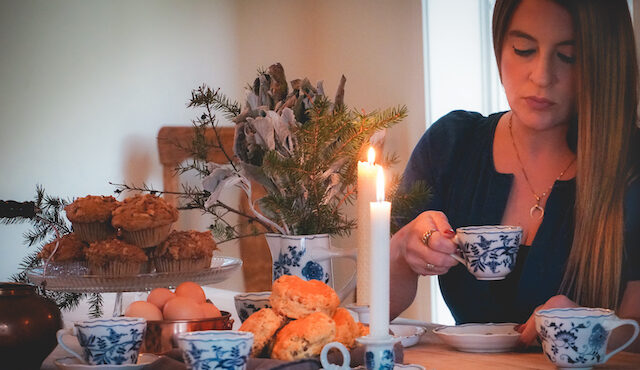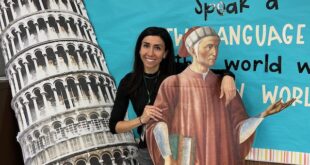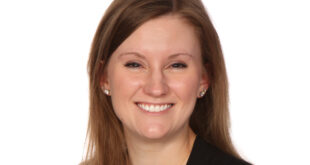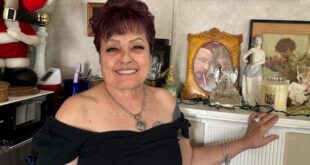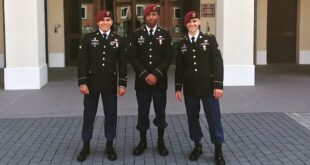Viewing her connection to her Italian heritage as a superpower, Dolores Alfieri has devoted most of her professional career to celebrating those strong ties.
From working as director of Italian affairs for the Office of the Governor of the State of New York to co-developing a podcast that celebrates the Italian-American experience, Dolores Alfieri’s professional and creative endeavors are a testament to her belief that a strong connection to one’s heritage is “a superpower.” Alfieri was instrumental in securing a place on the National Register of Historic Places for the Columbus statue in New York City’s Columbus Circle. Her work has earned her the Ambasciatore Award from the Italian American Museum of Little Italy and the Donna Distinta Award from the Conference of Presidents of Italian American Organizations. Alfieri also is a writer who praises the benefits of slowing down and incorporating Old World traditions in today’s fast-paced life.
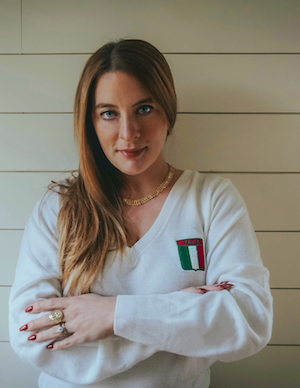 Fra Noi: Your parents emigrated from Campania shortly after their wedding, and you grew up in Suffern, New York. Tell me about how you were raised and the values they instilled in you.
Fra Noi: Your parents emigrated from Campania shortly after their wedding, and you grew up in Suffern, New York. Tell me about how you were raised and the values they instilled in you.
Dolores Alfieri: I was raised by two rather old-fashioned, very loving and fun, but strict, parents. They were supposed to come here for five or 10 years, save money and then go back to Southern Italy. My mother grew up very, very poor, and once she got here, she just didn’t see any reason to go back. She just knew that America was our best chance at a different kind of life. We were raised with the values that they took with them when they left Southern Italy. Growing up in New York, it’s all about “modern” and “new.” In my house, it was really about family, and it was about tradition — Italian traditions, Catholic traditions. It was a very Old World style of being raised. As a teenager, I really struggled with that. As I got older, I realized all of the benefits and the gifts inherent in being raised that way: a really strong work ethic, a real commitment to family.
FN: You developed a love for words and literature early on. Where did that come from, and how did you nurture it?
DA: There really wasn’t any literacy in my family until my and my siblings’ generation. We do have a streak of storytelling and musicians and handypeople who build things. I was born artistic, but in the house that I grew up in, I wasn’t going to get a box of paints and paintbrushes. That just wasn’t in my parents’ wheelhouse. So my creative outlet became writing, because paper and a pencil were very easy to find in the house.
FN: You co-founded the Italian American Podcast in 2015. How did that come about?
DA: It was the first podcast dedicated to exploring Italian-American heritage and where we come from, our roots and our traditions. I started it along with my then-co-host, Anthony Fasano. We had no lofty goals, and we didn’t plan on it becoming such a big part of our lives, opening so many doors and leading to so many friendships. We were able to get such great guests. People saw that this was something new, and the audience just came. We had a niche to fill, and from there, it just kept growing.
FN: Then, you started a second podcast, Bella Figura. Tell us about it.
DA: Bella Figura, which (in Italian) is the tradition of living beautifully, was my impulse to expand out of solely talking about Italian-American culture. I started to realize what a strength heritage could be, not just for Italian Americans, but for people of all different ethnic backgrounds. Here in America, so many of us have lost connection to our ancestral roots, our ancestral hometowns and cultures. I wanted to explore how we overlap and also how we can use those roots to really strengthen and enrich our lives. In Bella Figura, I talk to people of all different backgrounds, and we explore all kinds of ways that have impacted their careers, their lives, their livelihoods, the way they rear their children and so on.
FN: You’ve had hundreds of podcast guests. Do you have a favorite?
DA: I love talking to guests who have managed to add Old World values and Old World traditions into their modern lives. These days, there’s a real longing for that, with anything from raising chickens to baking bread. It’s about trying to cultivate a life where you’re slowing down and actually enjoying the days of your life, instead of living in this technology, fast-paced consumer blur.
FN: What do you think the Italian-American community needs, and how is it best served in today’s society?
DA: What you will encounter if you’re kind of doing work in this field is a constant attempt to dismiss us as just assimilated Europeans, despite the fact that we keep self-identifying by our ethnicity. When it comes to Italian Americans, it’s like, “What are you guys whining about? What do you even want? … Just go and be white.” That’s the underlying message. That’s the key point No. 1: being acknowledged as a strong and valid ethnic group. After that, it’s representation in various [political] offices. If you have, for instance, the New York State Council on the Arts, and Italian groups are competing with various other groups to receive grants in the arts, and there’s nobody on that board reviewing these applications who is of Italian ancestry and identifying with their Italian ancestry, it really is a disservice to all those groups that are applying. That’s just a fact. That’s just how it works.
FN: You and your husband, Andrew, are raising a son, Angelo Giovanni, who is named after his grandfathers. What are you like as a mom?
DA: I find myself really relying on a lot of the traditions and culture that I was raised with. I can’t raise my son in the kind of strict discipline household that I grew up in, because we have to somehow create traditions and ways of being that are sustainable. I’m fairly strict, but I also try to be able to bend a little more than my mother did. I want to make sure that he has that superpower that I think heritage can be.
FN: Tell us about your goals for the future — anything you’re particularly looking forward to?
DA: I’m looking forward to expanding the Bella Figura platform, including continuing the podcast and my Substack publication, “The Tradition of Living Beautifully.” I have several manuscripts I’m working on publishing. “The Dreams That Break Your Heart” is a memoir of my family’s beginnings in Southern Italy through its immigration to New York and the hard beginnings, interspersed with my own stories of growing up a modern, free-spirited girl in an old-fashioned immigrant family. “The Rooted Life: A Modern Guide to Old World Style,” is a nonfiction work that explores how to slow down, incorporate Old World traditions into modern life — from gardening to antiques to preserving your own food — and rituals and traditions that use heritage to root and enrich our days.
FN: Give us three words that sum up your personality.
DA: Sensitive, as in, I feel things very deeply in a way many people don’t seem to. Traditional. Rebellious.
The above appears in the September 2023 issue of the print version of Fra Noi. Our gorgeous, monthly magazine contains a veritable feast of news and views, profiles and features, entertainment and culture. To subscribe, click here.
 Fra Noi Embrace Your Inner Italian
Fra Noi Embrace Your Inner Italian


